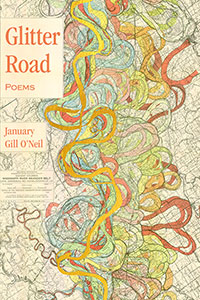 *
*
Interview with Doug Holder/co-president of the New England Poetry Club
I think I first met the poet January O’Neil quite a few years ago at a meeting of the Somerville Bagel Bards in Davis Square. Since then, she has become a respected English professor at Salem State University, and an acclaimed poet. She generously accepted my offer to interview her about her new collection of verse, Glitter Road (CavanKerry). On her publisher’s website it states:
“Glitter Road reflects on the end of a marriage, loss, and a new relationship against the backdrop of a Mississippi season. She explores the history and legacy of Emmett Till, how his story is braided with hers, and how race binds us all together. These poems reclaim the vulnerable, intimate parts of a life in transition and celebrate womanhood through awakenings, landscapes, meanders, and possibilities.”
Doug Holder: Glitter Road deals with the many losses, transitions, as well as possibilities in life. You write about your poetry collection and yourself, “I am done telling the kinder story. I am a myth of my own making.” Can you talk a bit about this statement, and its reflection in your poetry?
January Gill O’Neil: My favorite line! It is the truest line in the book. That line is from the poem Woman Swallowed by Python in Her Cornfield. As a writer of a certain age (I turn 55 in February), I am finding that all of the things I used to fret about – not having enough time, opportunities, love – all of those worries melt away as I get older and gain more experience. I am telling my story my way. If I don’t do it, who will?
DH: In your poem Autopsy you write about your deceased ex-husband. You take a hard look at yourself – the things that were said and perhaps not said. You write in the poem, “This is a memory coming up for air.” It seems that this memory is festering, and the only elixir for it is to bring it to the surface – the light of day. Did you have a catharsis of sorts, writing the poem?
JGO: It was cathartic in the way that saying that unsayable thing is cathartic. Making Autopsy the first poem in Glitter Road is scary and makes me feel extremely vulnerable. It’s also necessary for the book’s narrative.
DH: In the poem On the Edge of a Field in Sumner, Mississippi you write about your trip to the town where Emmett Till’s killers were acquitted. The landscape is the main character in this poem, and it pulls you in to this poignant reflection about the plight of past and present African American men and women – and indeed, your own life. Did this poem come to you deliberately, or did it hit when you arrived in town, and saw that field of nightmares?
JGO: I imagined a field of my ancestors picking cotton. So much of what I felt in the Delta was the trauma of the land. At the time, the feeling hit me in a wave all at once. But it took me months to write it down. I needed to live with it, to decide how I felt about it, and to reveal it in a poem.
In 2019, I was awarded a fellowship to the University of Mississippi, Oxford, as the John and Renée Grisham Writer in Residence. I moved my then-teenagers (and new puppy) down for one academic year, and we became part of the community. Everyone we met was kind and welcoming. In October, my daughter and I attended the re-dedication of the Emmett Till River Site Memorial Marker at Graball Landing. Previous markers had been vandalized on three separate occasions. We stood beside the turbid waters of the Tallahatchie where Till’s bloated body was pulled out. For the rest of my time, I researched Till’s story, went to sites and spoke with people who had first-hand knowledge of what happened back in 1955.
To my surprise, I found a part of myself in the red dirt, in every wild daffodil that was, most likely, on a plot of land worked by an enslaved person.
DH: Your poems deal with a lot of sorrow, but there are ample doses of humor and hope. How do you keep the faith?
JGO: I love that question, Doug! It’s not easy. But that’s precisely why poetry is a necessary art. We go to poetry for connection. To feel something. To not feel so alone. At my center is joy, which is the other side of the pain. I make a conscious effort to stay open to possibility and see the world anew each and every day. It doesn’t always happen, of course. Life intrudes: the dog wakes me up at 4:00 a.m.; the kids, home on break, leave dishes in the sink (a pet peeve of mine); someone cuts me off in traffic. And with so much unrest in the world today, it’s easy to lose faith. That’s when I need poetry the most.
DH: Why should we read your book?
JGO: Another excellent question! I hope your readers discover Glitter Road because it captures a story of self-discovery and transformation. My experience is both intimate and universal. I hope readers will be able to see themselves in these pages, and find community while exploring the themes of love, loss, race, history, and identity. Glitter Road weaves a personal narrative with the legacy of Emmett Till against a Southern backdrop. But there is so much wonder and joy in these pages. My story is an American one that revels in the beauty and complexities of life. I invite everyone to join me on this journey that celebrates what connects us all.













Reader Comments